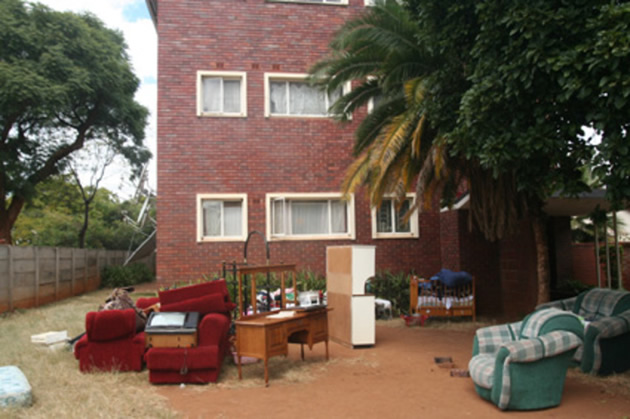Rent Board: A toothless bulldog?


The Rent Board is there to protect both the landlord and the tenant on an equitable basis to avoid scenes like this
Pardon Gotora
In our neighbourhoods, especially in the urban areas, there is brisk business in letting out immovable properties, be they houses or office buildings. The arrangement is that one becomes a lessor (landlord/ landlady) and the other party becomes a lessee (lodger/ tenant). At some point, this union has to come to an end.
In most instances, the divorce tends to be tart, words are exchanged, movable properties are thrown outside and others are locked outside while electricity is switched off.
The Rent Board is the shoulder to lean on when such fate strikes. While the board has been in existence since time immemorial, very few people seem to be acquainted with its operations and some do not even bother to report the cases for fear of victimisation.
Others are of the opinion that the board is somehow biased towards tenants.
The Rent Board is a tribunal that arbitrates in disputes between a landlord and a tenant. It was created in terms of the Housing and Buildings Act (22:7). This Act of Parliament authorises the minister responsible for its administration to create the Rent Boards. In this case, it is the Honourable Minister of Local Government, Public Works and National Housing.
The same minister is also authorised by the same legislation to make rent regulations by way of the Statutory Instrument.
The contemporary SI is No. 32 of 2007 which guides the operations of the Rent Board.
It is critical to note that there are two types of Rent Boards, that is, Commercial and Industrial Rent Board and the Residential Rent Board. The thrust of this dossier is on the latter.
The composition of the Rent Board includes a chairperson, who is usually a magistrate, and any other two members who may include an independent valuer.
The board also comprises a secretariat which is the first port of call for the people to lodge their complaints where cases are preliminarily sorted according to their merits and there is a nominal fee that is charged.
Those that warrant a formal hearing will then be referred to the Rent Board while some that do not can be resolved by the secretariat as and when they sort the cases.
The main functions of the Rent Board are centred on presiding over disputes between a landlord and a tenant and deal mainly with rent orders and evictions.
The rent disputes emanate from disagreements between the landlord and the tenant over rent to be levied for the property being let.
The dispute often arises when the former wishes to increase rent for the property while the latter feels the rent increase is too high. In most instances, when the tenant complains that the rent increase is unaffordable, he or she is told to look for alternative and cheap accommodation.
He or she is given an immediate notice of eviction and from then on, relations become sour between the two parties. Very few parties are patient enough to agree to negotiate on the rentals to be charged.
On the other hand, eviction disputes arise when the tenant incessantly stays in the house or dwelling long after the notice period of eviction granted has lapsed.
This usually prompts the landlord to push out the tenant using unorthodox means in a way to be rid of the problem. All these challenges summon the Rent Board into action.
The aggrieved party can make an application to the Rent Board for the determination of a fair and judicious rent to avoid prejudice to the other party, hence the inclusion of the independent valuer.
There are copious issues that are deemed as unfair practices by both the landlord and the tenant or lodger.
Below is a list of some of such unfair practices.
Unfair practices by the landlord/ lessor include:
Inadequate notice of eviction — it is stipulated that the tenant should be given three calendar months of written notice;
Demand for excessive rent and rates charges;
Non-issuance of receipts upon payment of rent;
Non-signing of lease agreements;
Attachment of property without tenants’ consent;
Trespassing into the tenant’s dwelling or invading the tenant’s privacy;
Illegal removal of the tenant’s property;
Disconnection of water, electricity to force eviction;
Denying the tenant access to property while on notice
Rent increase during the notice period
Failure to refund good tenancy deposit
Unfair practices by tenants/lodgers include:
Late payment of rentals – after the agreed date or after the seventh day of every month;
Non-payment of rent and rates;
Material damage to property belonging to the lessor/ landlord, including the premises;
Abandonment of property inside the premise
Continuous occupation of the premise well after the expiry of the notice of eviction.
It is my strong conviction that in one way or the other we all have come across at least one of the above-mentioned situations, whether as the landlord or as the tenant.
We usually sweep the circumstances under the carpet for fear of victimisation or in trying to save the marriage. However, very few people believe that the Rent Board can help them in any way to save their stay in the property or to eject their niggling tenants.
Instead they feel that it is there to exacerbate the situation than solve the problems. For instance, imagine the landlord being compelled to stay with his/her tenant for the next three calendar months.
In contrary, the Rent Board is there to protect both the landlord and the tenant on an equitable basis.
If one is at the wrong end of the law, it must be allowed to take its course irrespective of one being the landlord or the tenant.
It is vital to point out that when wishing to evict a tenant a written notice of eviction asserting the period of the notice and the reasons for wanting the tenant out of the premise should be served.
The statutory requirement for notice of eviction is three calendar months. If the written notice does not specify the reasons for eviction, the chances are that the application maybe dismissed by the Rent Board.
Some of the reasons why one can be given the notice include, but are not limited to; wanting to renovate the house, wanting to occupy the house yourself, non-payment of rent by the tenant, the size of the family.
When applying for an eviction or rent order, the aggrieved party shall approach the secretary of the Rent Board and pay a nominal fee which will enable you to be issued with summons which must be served to the respondent, at least 14 days before the date of the hearing of the case.
The summons can be served by a police officer from the nearest police station — it is critical to consider the area of jurisdiction of the police station serving the summons.
The Messenger of Court can also be utilised in serving the summons. However, there are instances where the respondent refuses to accept the summons, the police officer endorses that the respondent has denied accepting it.
In the event that the application for ejectment has been successful, you will be granted with an Ejectment Certificate appendixed with the copy of the judgment.
Thereafter, you will be required to approach the Magistrates’ Court with the requisite documents from the Rent Board to pursue the services of the Messenger of Court. In other words, you need to be armed with an Ejectment Certificate from the Rent Board before applying for an Ejectment Order from the Magistrates’ Court.
Hence, while Zimbabwe is commemorating the 16 Days of Activism Against Gender Violence, we also need to commemorate 365 days of activism against abuse by the tenants and landlords.
Together we can make a difference. Let us break the silence on the abuse, speak out, that is the only way you can be heard.
The Rent Board does not go around looking for matters, you report them and that is how they are able to assist you.
Let us make full use of the Rent Board, it is there to serve you, just like ZIMRA’s payoff line.
- Pardon Gotora works as a Housing Officer in the Ministry of Local Government, Public Works and National Housing. He writes in his personal capacity. The opinions and views expressed therein must not be viewed as those of the ministry. Feedback: [email protected]









Comments